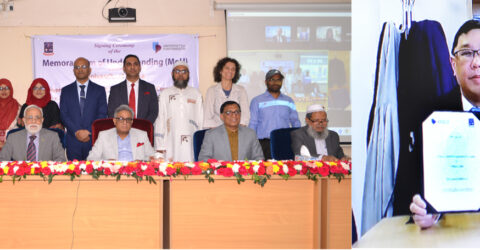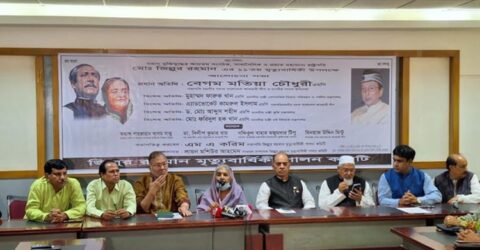
Rafiqul Alam Khan
Fazle Rabbi Miah- the Deputy Speaker and an elected member of the Jatiya Sangsad is a veteran politician. He venerates Bangabandhu Sheikh Mujibur Rahman as the epitome of ideal political leader. His splendid political career is spanning over three decades. A humble person from the grassroots of Gaibandha has transformed himself into a leader of Bangladesh’s national legislative assembly. In a conversation with The Bangladesh Today, he shared his colorful life journey with us.
You’re simultaneously a politician, a people’s representative and a social activist: What position has helped you to contribute to the maximum for the society.
I was involved in the politics when I was an 8th grader. It was the time when General Ayub Khan introduced martial law, a very politically charged situation in the erstwhile East Pakistan. One of my uncles happened to be the president of local union Awami League. He persuaded me to lead a procession against the imposed martial law in our neighborhood. Furthermore, I actively engaged in political activities when I was in class ten. At that time, we were prohibited to run political activism under the banner of organized student bodies like today’s Chattra League or Chattra Union. Instead, we used metaphoric names to pursue our political aspirations. The name of our student body was ‘Agradut’ in Gaibandha College. I performed the role of the convener of that youth led student body of Awami League. We campaigned against a report commissioned by the Education Ministry in different schools and colleges and public student meetings at that time. There were very few speakers who spoke to popularize that particular movement in our locality and I was one of them. Community leaders, guardians and other respected members of the society praised us for our revolutionary works. During that period, students like us were appreciated for their high moral and determination to work for the community which is unfortunately absent from today’s society. So, my engagement in politics and passion to do something for the society stemmed from that time. Never in my life had I backed myself from ensuring the rights of the people.
My activism in schools, colleges and various public student meetings to support the cause of the people and intense public engagement resulted in the rise of my popularity as a politician in the Gaibandha region. Later in my political life, I never missed a chance to serve the people. Whenever there is drought, flood or massive inundation in my locality; I immediately ran to that specified area to help the affected people. That’s why I am very close to people’s hearts. I would like to share a story on this occasion. Decades ago, when I was a practicing lawyer in Gaibandha, a guardian of a local college had put my name in the college governing body’s election. I didn’t have the opportunity to be present in that election in person due to my professional responsibility but I managed to win that with a big margin. The incident made me comprehend the value of having goodwill. From then, I always tried to give back to the nation and show respect to the faith of the people has in me.
I am a very gregarious person who believes to influence people with amicable behavior. I don’t want to hurt anybody with my speech. I remain so careful about that. I think my political identity has transcended over my other identities as a community activist and a member of parliament.
You may recall, when Bangabandhu Sheikh Mujibur Rahman agreed to participate in the 1970’s election under the Legal Frame Order, many political parties including veteran politicians like Maulana Bhasani boycotted it by saying ‘Kick the ballotbox’. Their popular slogan was “We want food not vote’. But Bangabandhu kept on going for the election in the face of opposition by other politicians, thinking that he needed a mandate at least to make a change for the Bengali nation. In support of Bangabandhu’s mandate, I was one of the first persons from north Bengal who led a mute procession from Bar Library in Gaibandha Subdivision.
Tell us about your constituency “Gaibandha-5”. How far it has come after the 1971’s war of liberation.
Gaibandha is a district in the northern region of Bangladesh. Historically, people from that region are poor as they usually experience several natural calamities over the years. I remember, in 1970, Lutfor Rahman was elected as the first member of parliament from Gaibandha. My current constituency was consisted of upazilas of Saghata, Gaibandha Sadar and Phulchori. I was so eager to participate in the 1970’s election as a voter that I took my father to the poll center by spending Rs. 40. It was a decent amount that was spent just to cast a vote for Awami League. Since then, the region has come a long way. The significant improvement that can be noticed from visiting the region one can experience is the infrastructure development. You will be surprised to know that even in the Char areas I have facilitated to build paved roads, electricity and other public amenities.
Every year, for a certain period of time the people of Gaibandha-5 have to deal with prolonged flood. To tackle this situation and to come into a sustainable solution, we’ve started to implement a project valued 300 crore. Successful implementation of this project will permanently stop the river erosion in that area. Arrangements have been made to supply electricity from the neighboring district of Jamalpur.
Phulchori upazilla was considered the most back-warded part of Gaibandha. Now, people of this upazilla have become self reliant by producing cash crops like jute, maize and chilies. Their agri-products are in high demand across the country.
As a freedom fighter in the sector 11 how did you contribute to organize the liberation war
When the war started in full scale, I crossed the border to reach into Dhuburi- an area in the Goalpara district of the Indian province of Assam. After that, I had joined in the Bangladesh Liberation Council as the Office In-Charge. My primary task was to recruit and train potential people to fight against the Pakistani oppressors. When the monsoon arrived, I saw raw jutes from northern districts of Bangladesh were smuggling into India. I made the effort to put a stop into that practice by levying taxes upon them. This initiative resulted in securing a profit of 2 crore Indian rupee for the incumbent Bangladesh government. Then I was given the task of starting the civil administrative activities in the Roumari region. Under my leadership, the court house and other government offices were established.
After that, I was sent to Kolkata with a delegation to have a dialogue with two CIA agents from the USA. I was able to persuade them that a significant portion of the eastern side of East Pakistan was under the control of Peoples Republic of Bangladesh. I also told them the atrocities committed by the Pakistani army throughout the country are beyond imagination. Back in the country, my other works include helping the injured freedom fighters to heal from trauma and regain health.
What steps do the parliament has taken to resolve the quorum crisis?
I believe the current sessions have been free from so called quorum crisis. The issue has been resolved. We ran some courses to better orient the members with the norms of the parliament. But, I would like to give much credit to our honorable prime minister as she ensures her presence at least five minutes before every session starts. We’ve strictly instructed the whips to maintain the rules of procedures.




